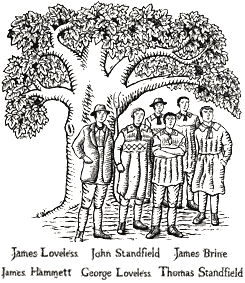Sheila Rowbotham on the Tolpuddle Martyrs

From here:
In 1834, six agricultural labourers, three of whom were Methodist lay preachers, were sentenced to transportation to Australia. Every year they are commemorated by the Trade Union Congress, at a festival in Tolpuddle in Dorset, as the founders of the trade union movement...To mark the 175th anniversary of their trial, the festival screened Bill Douglas's epic, long-lost and finally rediscovered film Comrades: A Lanternist's Account of the Tolpuddle Martyrs. Having attained almost mythical status since its release in 1986, the film is now being reissued by the British Film Institute (BFI).
By 1834 trade unions had been legalised, so the Tolpuddle men were charged under a nearly forgotten law that made it illegal to administer oaths. The names of the martyrs - George and James Loveless, Thomas and John Standfield, James Brine and James Hammett - might easily have been erased from history, like those of so many other hapless victims arraigned under a class-skewered legal system. Instead, the Grand National Consolidated Trades Union, inspired by the co-operator Robert Owen's hopes for "a new moral world", mounted an agitation for their release. The moderate radical MP JA Roebuck noted the political implications - the case revealed "that the House of Commons does not represent the feelings of the people". This was an ominous indictment of the legitimacy of the recently reformed parliament and the Whig government. To the petitioners and demonstrators these were merely the new tyrants.
Feelings ran so high that, incredibly, the men were pardoned and granted free passage back to Britain. It took three more years for them all to come home as the authorities were more tardy in tracing and releasing them than they had been in hustling them away. Nevertheless, against all odds, the Tolpuddle Martyrs returned. The victory became a symbol to a working-class movement of the power of combination, not only in the matter of wages but in the achievement of democratic power through a charter of political rights...
Labels: class struggle, film, history, socialism




0 Comments:
Post a Comment
<< Home